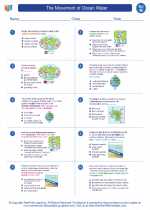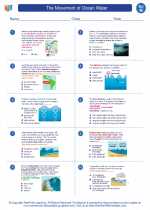Lakes: An Overview
A lake is a large body of water that is surrounded by land. Lakes can be found all over the world and vary in size, depth, and characteristics. They are formed through various geological processes, such as glacial activity, volcanic eruptions, or tectonic movements.
Formation of Lakes
Lakes can be formed through different processes, including:
- Glacial Activity: During the last Ice Age, glaciers carved out basins that later filled with water, forming lakes. Examples of glacial lakes include the Great Lakes in North America.
- Volcanic Activity: Volcanic eruptions can create depressions that fill with water, forming volcanic crater lakes. Crater Lake in Oregon, USA, is a well-known example of this type of lake.
- Tectonic Movements: Shifts in the Earth's crust can result in the formation of lakes in rift valleys, where the land has subsided between two parallel faults. The East African Rift is an example of a region with numerous rift valley lakes, including Lake Tanganyika and Lake Malawi.
Ecological Importance
Lakes play a crucial role in the ecosystem by providing habitats for a wide variety of plants and animals. They also serve as sources of drinking water, support agricultural activities, and offer recreational opportunities for people.
Environmental Challenges
However, lakes face numerous environmental challenges, including pollution, habitat destruction, and the introduction of invasive species. Human activities such as urbanization, agriculture, and industrialization can have negative impacts on the health of lakes and their surrounding ecosystems.
Study Guide
Here are some key points to remember when studying lakes:
- Describe the processes involved in the formation of lakes, including glacial, volcanic, and tectonic activities.
- Explain the ecological importance of lakes and their role in supporting diverse plant and animal life.
- Discuss the environmental challenges that lakes face and the potential impacts of human activities on their health.
- Identify specific examples of well-known lakes around the world and the unique features of each.
- Consider the ways in which lakes contribute to human societies, including providing resources for drinking water, agriculture, and recreation.
By understanding the formation, ecological importance, and environmental challenges of lakes, you can gain a deeper appreciation for these natural bodies of water and the importance of preserving their health and integrity.
[Lakes] Related Worksheets and Study Guides:
.◂Science Worksheets and Study Guides Eighth Grade. The Movement of Ocean Water

 Worksheet/Answer key
Worksheet/Answer key
 Worksheet/Answer key
Worksheet/Answer key
 Worksheet/Answer key
Worksheet/Answer key
 Vocabulary/Answer key
Vocabulary/Answer key
 Vocabulary/Answer key
Vocabulary/Answer key
